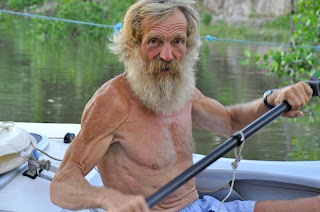By: Pete Thomas, GrindTV.com
Aleksander Doba, sapped of strength but nonetheless jubilant, paddled ashore in northeast Brazil on Wednesday afternoon, completing a transatlantic kayaking expedition that lasted almost 99 days and spanned 3,320 miles.
It's believed to have been the longest-ever solo-kayaking voyage, in terms of time spent at sea. He spent Wednesday afternoon and evening being checked by doctors and sleeping. On Thursday the 64-year-old Polish adventurer, thickly bearded and disheveled but appearing remarkably fit, told a small gathering in the remote fishing community of Acaraú, that after a little more rest he'd like to climb back in and paddle to the United States.
Doba left last Oct. 26 from Dakar in west Africa, aboard a customized 23-foot sea kayak, which is only only 39 inches wide. This was his home for 98 days and 20 hours.
Three others have kayaked across the Atlantic: Franz Romer in 1928; Hannes Lindemann in 1956, and Peter Bray in 2001. But none of those expeditions was directly from continent to continent (they utilized offshore islands), and none of those paddlers was a senior citizen.
"He's 64 years old! The physical challenge would have broken men half his age," Jeff Moag, editor of Canoe & Kayak magazine, said of Doba. "The amount of will power it took him to keep going is amazing. To any of us who have done a long paddling expedition, it's humbling."
Canoe & Kayak followed the odyssey from the outset. It was plagued almost from start to finish by storminess and unfavorable currents. The paddler, whose excursion was plotted via a global satellite positioning unit, covered 680 miles in a straight line before conditions began to work relentlessly against him.
In early January his son, Chez Doba, emailed Canoe & Kayak's Conor Mihell and stated to the reporter: "After going in circles for over a month, being stormed on almost every day, being accompanied by barracuda and sharks, who wouldn't be tired?"
Doba's vessel has a small forward compartment in which he napped when conditions allowed. His desalination unit stopped functioning automatically on Jan. 11, making it difficult to obtain drinking water; since then he relied largely on gathering rainwater. His meager freeze-dried food supply was supplemented occasionally with fresh fish. At times he had to maneuver over waves measuring 20-plus feet.
Doba, an expert whitewater kayaker, carried a satellite phone and Tweeted sporadically. One of his early Tweets: "Since the beginning I see a lot of sharks. Often they surface, but sometimes they stay a few meters underwater. I can only splash, no swimming!"
His journey was close to the equator where, he informed his followers, "It's extremely hot. I sleep about 2-3 hours per night. During the day it's impossible."
Doba, who speaks almost no English, also relayed messages to his son, which were posted on his blog. On Monday, as a powerful south wind shoved him off-track to the northwest and threatened to delay landing, this was posted on his blog: "I'm very tired. I dream to finally finish, wherever it will be. I'm afraid that the south winds push me so I have to paddle for many days. No! I want dry land as soon as possible."
It turned out to be a two-day delay, 50 miles beyond where he had hoped to land. Those two days, Doba assured, were like an eternity.
Photos: ©Arsoba Travel, Poland


